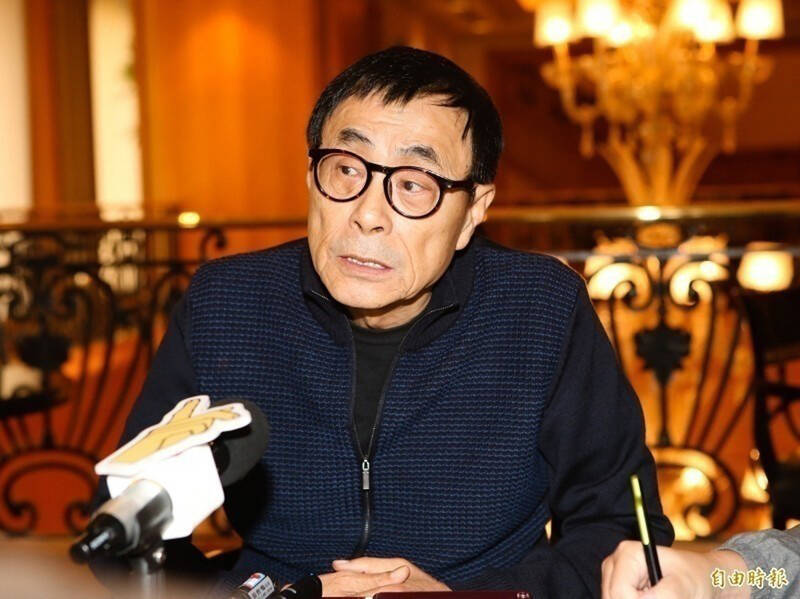Famed romance novelist Chiung Yao (瓊瑤) was found dead in an apparent suicide at 86 years old, two days after pop culture icon Steven Liu (劉家昌) died of cancer at age 83, sources said.
Police found the writer dead of an apparent suicide in an apartment in New Taipei City’s Tamsui District (淡水) after receiving a call at 1:22pm from one of Chiung’s in-laws, a New Taipei City Police Department spokesperson said yesterday.
Officers did not summon medics after deeming Chiung impossible to resuscitate, they said.

Photo: Taipei Times
Chiung’s family told investigators that the son of the novelist received a note addressed to his wife’s secretary, which he sent unopened, the spokesperson said.
Realizing that the document was a suicide note, the daughter-in-law reportedly rushed to Chiung’s residence to find that she had died, they said.
Chiung had for many decades been the leading romance author in Taiwanese popular literature, writing best-selling novels and screenplays, and producing shows.

File Photo: Taipei Times
In 2017, Chiung came out as a supporter of assisted dying, writing in a Facebook post that her husband’s long struggle with illness demonstrated the necessity for a humane end to life.
Separately yesterday, Liu’s family in a statement said the veteran entertainer had died on Monday after battling cancer.
Liu, nicknamed the “grandfather of Chinese-language pop music,” sang, composed, acted and directed numerous works throughout his long career in Taiwan and Hong Kong.
The family requested the public respect their privacy as they wished to mourn in peace.
“Thank you for your consideration and understanding. We also ask that friends from the media give us space so that we can quietly mourn,” they said.
Liu was credited with composing many classic songs for stars, including Unforgettable Past by You Ya (尤雅), On the West Tower Alone by Teresa Teng (鄧麗君), Promise by Liu Wen-cheng (劉文正) and Sea Gull by Weng Qian-yu (翁倩玉).

POSITIVE DEVELOPMENT: Japan and the US are expected to hold in-depth discussions on Taiwan-related issues during the meeting next month, Japanese sources said The holding of a Japan-US leaders’ meeting ahead of US President Donald Trump’s visit to China is positive news for Taiwan, former Japan-Taiwan Exchange Association representative Hiroyasu Izumi said yesterday. After the Liberal Democratic Party’s landslide victory in Japan’s House of Representatives election, Japanese Prime Minister Sanae Takaichi is scheduled to visit the US next month, where she is to meet with Trump ahead of the US president’s planned visit to China from March 31 to April 2 for a meeting with Chinese President Xi Jinping (習近平). Japan and the US are expected to hold in-depth discussions on Taiwan-related issues during the

‘LIKE-MINDED PARTNER’: Tako van Popta said it would be inappropriate to delay signing the deal with Taiwan because of China, adding he would promote the issue Canadian senators have stressed Taiwan’s importance for international trade and expressed enthusiasm for ensuring the Taiwan-Canada trade cooperation framework agreement is implemented this year. Representative to Canada Harry Tseng (曾厚仁) in an interview with the Central News Agency (CNA) said he was increasingly uneasy about Ottawa’s delays in signing the agreement, especially as Ottawa has warmed toward Beijing. There are “no negotiations left. Not only [is it] initialed, we have three versions of the text ready: English, French and Mandarin,” Tseng said. “That tells you how close we are to the final signature.” Tseng said that he hoped Canadian Prime Minister Mark Carney

President William Lai (賴清德) yesterday bestowed one of Taiwan’s highest honors on Saint Vincent and the Grenadines (SVG) Ambassador Andrea Clare Bowman in recognition of her contributions to bilateral ties. “By conferring the Order of Brilliant Star with Grand Cordon on Ambassador Bowman today, I want to sincerely thank her, on behalf of the Taiwanese people, for her outstanding contribution to deepening diplomatic ties between Taiwan and SVG,” Lai said at a ceremony held at the Presidential Office in Taipei. He noted that Bowman became SVG’s first ambassador to Taiwan in 2019 and

A man walks past elementary school artworks at the Taipei Lantern Festival in Ximen District yesterday, the first day of the event. The festival is to run from 5pm to 10pm through March 15.